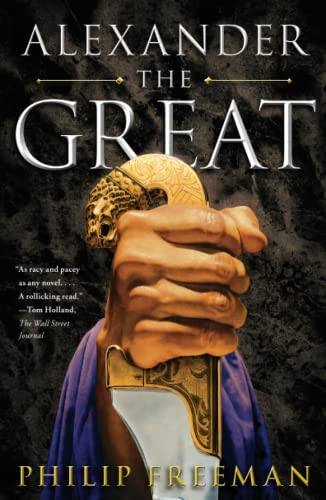In this post, you will find a book review of Alexander the Great’s biography, featuring some of the best ideas from the book.
Alexander was born into a royal Macedonian family in the year of 356 B.C. As he grew up, he learned quickly from the philosopher Aristotle, who tutored him. He was not very old when he first took command of an army, which he first led through Greece to quench rebellion uprisings, and then through the Persian empire to unite his kingdom and spread Hellenism – Greek culture – in the world.
Philip Freeman is the author of the book that I believe to be the best biography of Alexander the Great. Philip is a Qualley Professor of Classics at Luther College in Decorah, Iowa, and the author of several other books featuring ancient times, including Julius Caesar and Oh My Gods.
Being fond of ancient figures, I enjoyed this book very much. By looking at how Alexander lived his life, I believe there is a lot we can learn about human drive, ingenuity, and undauntedness in the face of danger.
“In the words recorded by Mohammed, he was a philosopher-king ‘whom God made mighty in the land and gave the means to achieve all things.’”
– Philip Freeman in Alexander the Great
Also On YouTube: Summary of Alexander the Great (Best Biography)
If you would like to watch a summary of this Alexander the Great biography in video format, have a look at this video I put out on YouTube. If not, then you can keep reading below!
Alexander and Bucephalus
At the young age of 12, Alexander stood up to his father, King Philip II, and told him that “he lacked the courage and skill” to manage the unruly horse Bucephalus. Philip’s most experienced horse tamers had not even been able to gain control of this creature. Alexander said he would personally pay 13 talents (enough money to support a person for a lifetime) if he didn’t succeed in taming Bucephalus.
When Alexander approached the horse, it was visibly deterred. Watching the horse closely, he was able to infer the reason for its nervousness: it seemed frightened of its own shadow. Upon seeing this, he turned the horse towards the sun, and not away from it, thereby removing the shadow, and with it, the fear. Looking at situations from a different perspective is one of the characteristics that defined Alexander’s person, as much in taming Bucephalus as in deciding on the correct military strategy in his battles.
The fact that nobody believed Alexander could tame Bucephalas makes him an Iconoclast, which, according to Gregory Berns who wrote a book with the same name, means “doing the things that other people say can’t be done.”
Who tutored Alexander the Great?
Most people who have been introduced to Alexander know that he was tutored by Aristotle while he was young. But another quite interesting figure was also given responsibility for the coming king’s tutelage. His name was Leonidas, and in way of charm and subtlety, he was quite like the ancient Spartan king many know from the movie 300.
Leonidas was related to Queen Olympias, Alexander’s mother, and Philip’s wife, but this did not deter him from giving the boy a hardy upbringing. Later in life, Alexander recounted that “Leonidas’ idea of breakfast was a forced march through the night, and of supper, a light breakfast.” Leonidas would regularly go through Alexander’s chests to ensure that his mom hadn’t prepared any luxuries for him, leaving him with only the bare necessities. Looking at the marches and hasty battle initiations Alexander himself forced his men through on his campaigns, it might just be that Leonidas’ harsh tutoring cultivated some toughness in the boy.
Alexander, the Embodiment of Ambition
Undoubtedly, one of the worst things that could befall Alexander, this colossus of a man, was to lose. To lose a battle, a city, an empire. He was an embodiment of pure ambition, an ambition that stretched across Europe and Asia – in short, the known world.
It is easy to bewail and condemn a man who was the sole cause of so much slaughter, and it is hard to not admire the ambition and the belief he kept through all his trials and tribulations. Alexander the Great will forever be remembered and placed shoulder to shoulder with the likes of Caesar and Napoleon; personalities that couldn’t be stopped from attempting their most daring conquests.
If you intend to order this book from Amazon, I would be very grateful if you use the affiliate link below. Doing so won’t cost you any extra; it will just give me a small commission, and thereby make it possible for me to keep writing these book reviews. Thank you in advance!


